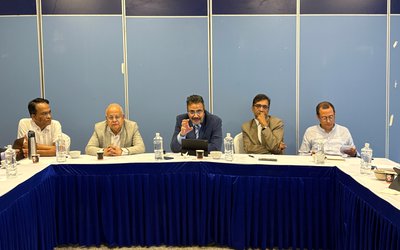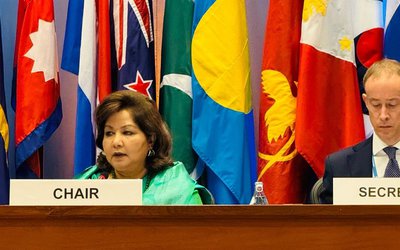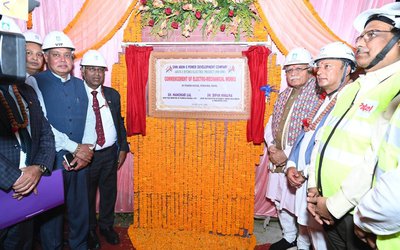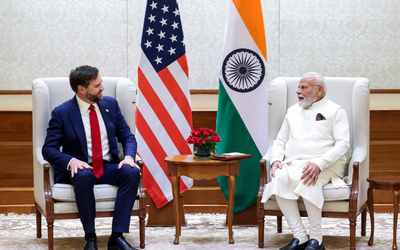
For Hagihon Company Ltd, Israel’s largest and most advanced regional water and wastewater utility, which has shown how to control leakage of water in Jerusalem, Israel’s capital, stopping a drop of water means increasing the volume of water supply and saving money. Brought through a long pipe from various sources up to 850 meters above the sea level, water is a very precious commodity in Jerusalem.
As Jerusalem is a mixed city with new and old settlements, it has also got a population of diverse ethnic and religious identities and one of the world’s most sensitive archeologies, checking the water leakage has been the most challenging task for Hagihon Company’s employees.
By using lancers and other technological innovation, Hagihon detects the linkages of water. With its efficient service, Hagihon’s provides quality water and waste water services to almost one million residents of the city of Jerusalem and the township of Mevasseret and Abu Gosh.
“Thanks to the new innovation, we are able to reduce the leakage below 10 percent,” said Joshua Yeres. “We are also sharing our expertise with the cities of different parts of the world to reduce leakage. We are planning to have a session on sharing innovation with Sao Paulo of Brazil and India and China.”
Alongside Brazil, India and China, Nepal is also known as a country of high leakage, which comes to almost above fifty percent, including the technical loss. Hagihon’s technology can be a game changer for Kathmandu Valley Drinking Water Ltd, which supplies inadequate water and often at the lowest quality.
With the innovation in water treatment and water management, Israel has shown the way to solve the drinking water crisis, waste water treatment and irrigating the desert through drip irrigation. Unlike Nepal, which annually receives over 1400 millimeter of rain and enjoys abundant fresh water reserve in Himalaya, Nepal has been unable to supply quality water for drinking and water for irrigation for farmers. In the worst case, it is wasting the wastewater in the urban areas.
With little rain, about 400-500 milimeter a year and small fresh water sea, Israel faced a severe water crisis a few years back. Thanks to the new desalination technology and successful methods of wastewater treatment, Israel has been able to supply water for drinking, irrigation and industry.
Israel’s achievement in water management was not achieved overnight. After years of investment in research and innovation, Israel finally found a way that worked.
Israel is now net exporter of water in the Middle East. It is exporting water to Jordan and Palestinian Authority.
With the technology, Israel turned the desert into a green field producing the agriculture products to fulfill Israel’s local demand as well as export to Europe and United States of America.
Safdan-Israel’s largest water treatment facility is now treating the waste water received from the urban Tel Aviv and supplying it to irrigate the land. Israel has reclaimed over 80 percent of its reused effluents in agriculture.
Along with bigger facilities like Safdan and Keren Kayemeth LeIsrael, Jewish National Fund (KKL-JNF) has built more than 230 water reservoirs throughout Israel, providing two-thirds of the water used for agriculture.
In Negev desert, Aryeh Pools works as a regional center for waste water purification of KKL-JNF. “This reservoir store recycles water collected from storm water runoff. Treated wastewater is then channeled to agriculture, preventing ground water pollution and freeing up fresh water for domestic use,” said Elisha Mzrahi, KKL-JNF, Public Affairs.
The water supplied by KKL-JNF has the potential to changing the livelihood of the local farmers of Negev desert turning the desert as a green field. Thanks to the drip irrigation technology, Israeli farmers use every drop of water to make the plant productive.
With the abundant water resources available, only less than 14 percent of Nepalese farmers have water to irrigate their land. Although they use the flood irrigation technology, Nepalese farmers waste much of water.
Along with a robust and dynamic industrial sector, the World Bank terms Israel is a world leader in water resource management.
Nepal’s Problems
Nepal is facing an all-out problem in water management. In the supply of drinking water, the leakage is over 60 percent in all major urban areas with low quality of water. The situation is similar in rural parts. According to World Health Organization, over 8000 children die annually because of dieaharia and water born disease.
In irrigation system, water distribution is poor. With almost a century long efforts, less than 20 percent of Nepalese land receives perennial irrigation facilities. Due to unfair water distribution, the farmers do not enjoy water equally. The flood irrigation system wastes much of water in the channel as well as at the farm land. Introduction of drip irrigation system can change the scenario as it will also help to increase the irrigated land.
So far as waste water treatment is concerned, Nepal is yet to look at the available technology and innovation in the country like Nepal. For almost last three and half years or 112 weeks, Nepal’s senior civil servant are taking a lead on Bagmati River Cleaning Campaign with the slogan of Normal Bagmati: Hamro Prayas.
One of the aims of the campaign is to clean the waste water that flows in the river Bagmati. At a time when technology and innovation are available in Israel, Nepal can really clean Bagmati River making it dip enough for religious people.
For Nepalese, the slogan 'rain, rain, everywhere but not a drop to drink' fits. However, for Israeli citizens, rain is nowhere but drops of water everywhere to drink and irrigate.
With over 70 percent water leakage, Kathmanduites cannot find the water they need although plans talk of getting water here from Himalayan River Melamchi through a 30-kilometer long tunnel. At a time when the government is changing the old pipeline, it will be most appropriate to learn from Haghon Company.
Organized by Israeli Ministry of Economy, twenty-one journalists from all over the globe recently spent four days in Israel touring Israel’s water installations and companies to raise international interests, with the goal of making the upcoming WATEC event in Tel Aviv in October.
At a time when Nepal has been facing complex water security challenges, it is good for Nepal’s business communities and government to learn more from Israel and enhance the water knowledge to deal with the challenges.
As Nepal’s water business is growing, Nepal’s business communities can also take the benefit from importing the Israeli technology in water quality and water purification.
“Israel has suffered from a chronic water shortage for years. The need for water led Israel to create innovative and advanced policies and solutions that have placed us as a world water leader. Israel is willing to share the experience with the developing world, said Naty Barak.
Located in one of the driest regions in the world, Israel has been dealing with a continuous shortage of water, which has worsened over the past few years due to prolonged droughts and an increasing population. Israel has had to manage water services while operating under extreme scarcity conditions, and has done so very impressively.
Its innovative practices are globally recognized – both from technological and institutional perspectives –and will undoubtedly carry lessons for many countries facing water security challenges.
“Today more than ever the world is looking to Israel for technologies to address water shortages,” said Oded Fixler, deputy director general at Israel’s Water Authority. “From California to India, the industry is looking to Israel as a successful case study to addressing water scarcity. We feel it is our responsibility to share our knowledge with countries in the world facing challenges in the water arena.”
Each of the four days of the visit centered around a couple of main themes, such as water start-ups, desalination and research, water conservation, drip irrigation, water reuse in agriculture and water education. The visits to sites and companies were carefully selected to cover each of the themes.
Also the fact that Israel has the ability to provide a growing population with clean water without disturbing the fragile environment sounds like a miracle. In a lot of ways Israel´s water management is a role model for countries all over the world. Nepal – obviously has enough natural resources, including water, and now there may be techniques for saving and cleaning it.
Drip irrigation was invented in Israel, and two of the world’s biggest drip-irrigation tech firms — Netafim and NaanDanJain — are Israeli. With drip irrigation, farmers water their crops using the precise amount of water needed, instead of just releasing large amounts onto a field (known as “flood irrigation”) and hoping for the best. Drip irrigation can save as much as 90% of the amount — and expense — of water used for crops, and is relatively inexpensive to implement.
“Although it manages water effectively, only 5% farmers use drip-irrigation technology around the world, with the rest relying on traditional flood irrigation,” said Barak, chief sustainability officer of Netafim.
“Farmers around the world are going to realize the advantages of drip irrigation. There will soon be twice as many mouths to feed in the world as there are now. And of all the much-discussed technologies out there, including genetic modification, the only technology that has been proven to expand the amount of available land for crop growing is drip-irrigation technology.”
Israel is anxious to share its water tech with everyone.
Scientists predict that by the year 2030 there will be at least eight billion people on earth requiring 50 percent more food than is produced today. By 2050, that food deficit is expected to increase to 70 percent. Almost two thirds of the world’s fresh water is used in today’s water intensive agriculture practices. About 30 percent of the food produced worldwide is lost or wasted each year. It doesn’t take a PhD in mathematics to understand that we are slowly but surely moving towards the biggest challenge the human race has yet to face — having sufficient food and water for all of the inhabitants of our planet.
In Israel, quietly and behind the scenes, a handful of brilliant entrepreneurs are pioneering technologies that are poised to revolutionize the world’s agricultural and nutrition industries.
“Israeli innovation has penetrated virtually every industry on the planet. Israel is a recognized leader in drip irrigation and desert agriculture,” said Oren Blonder of MemTech. "We are breakthrough technologies based on hard sciences, i.e. biology and chemistry, in a wide range of agro and food related areas.”
Many smattering Israeli startups are developing many software platforms and technologies connecting traditional agriculture with the digital age and water management as well.
Along with its new innovations and technologies, Israel is hosting WATEC Israel 2015 in October 13-15. For a country in a desperate need of tapping water through better management technologies and knowhow, the WATEC can be a boon for government officials, policymakers and business communities of Nepal as well.
Reporting from Tel Aviv, Haifa, Jerusalem and Negev (Israel).

Keshab Poudel
Poudel is the editor of New Spotlight Magazine.
- KUL MAN GHISING: Bowing Down To The People
- Apr 13, 2025
- POLITICAL VIOLENCE: Culture of Impunity
- Apr 11, 2025
- PM OLI MEETS PM MODI: No Progress
- Apr 09, 2025
- PM OLI’S THAILAND VISIT: Flip Flop
- Apr 08, 2025
- FM Dr. Deuba’s India Visit: Mission Aborted
- Mar 26, 2025















